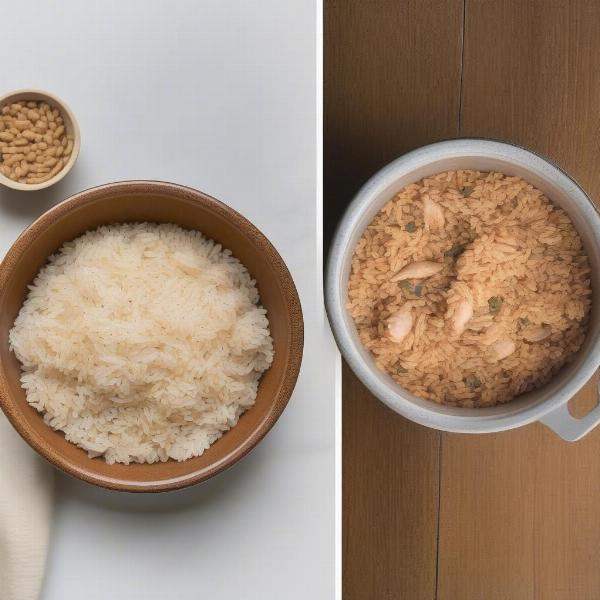When your furry friend is feeling “under the weather,” their appetite often takes a hit. Knowing what to feed your dog when they’re sick can be a challenge. “Under the weather dog food” encompasses a range of options and strategies to entice your dog to eat and provide the necessary nutrients for recovery. This article will explore the best practices for feeding a sick dog, including homemade recipes, commercially available options, and when to consult a veterinarian.
Recognizing When Your Dog is “Under the Weather”
A dog’s behavior can offer valuable clues about their health. Lethargy, vomiting, diarrhea, loss of appetite, and changes in water intake are common signs that your dog might be unwell. While a temporary loss of appetite isn’t always cause for alarm, prolonged disinterest in food warrants attention.
Choosing the Right Under the Weather Dog Food
If your dog is experiencing mild digestive upset, you might consider starting with a bland diet. Boiled chicken and rice are common ingredients for this type of diet, as they are easily digestible and gentle on the stomach. Alternatively, commercially available “bland diets” for dogs are also a convenient option. These diets are formulated to be highly digestible and provide essential nutrients.
Homemade vs. Commercial Under the Weather Dog Food
Preparing homemade dog food can offer control over ingredients and cater to specific dietary needs. However, it’s crucial to ensure nutritional balance. Consulting a veterinary nutritionist is highly recommended when formulating homemade diets for sick dogs. Commercial under the weather dog foods, on the other hand, offer convenience and are formulated to meet the specific nutritional requirements of ailing dogs.
 Comparing Homemade and Commercial Dog Food
Comparing Homemade and Commercial Dog Food
When to Consult Your Veterinarian
While dietary adjustments can sometimes help a dog feeling unwell, it’s important to consult a veterinarian if symptoms persist or worsen. Underlying medical conditions might require specific dietary management or medication. Your veterinarian can diagnose the issue and recommend the best course of action, including appropriate dietary recommendations.
Encouraging a Sick Dog to Eat
A sick dog might be reluctant to eat, even their favorite food. Warming the food slightly can enhance its aroma and make it more appealing. Hand-feeding small amounts or offering food in a lick bowl can also encourage eating. lick bowls for dogs can be especially helpful for dogs with nausea. In some cases, your veterinarian might recommend appetite stimulants.
Transitioning Back to Regular Food
Once your dog starts showing signs of recovery, gradually transition them back to their regular diet. Mix increasing amounts of their regular food with the under the weather food over several days to avoid digestive upset.
Conclusion
Choosing the right “under the weather dog food” and knowing when to seek professional advice is crucial for your dog’s well-being. By understanding your dog’s needs and following the guidelines outlined in this article, you can help your furry companion recover quickly and comfortably. Remember, a healthy appetite is often a sign of a healthy dog.
FAQ
- How long can a dog go without eating when sick? While a short period of decreased appetite can be normal, prolonged loss of appetite (more than 24 hours) warrants veterinary attention.
- What are the signs of dehydration in a dog? Dry gums, sunken eyes, loss of skin elasticity, and lethargy are signs of dehydration.
- Can I give my dog human medication for upset stomach? Never give your dog human medication without consulting a veterinarian. Many human medications are toxic to dogs.
- What are some bland foods I can feed my sick dog? Boiled chicken and rice, plain cooked sweet potato, and low-fat cottage cheese are examples of bland foods.
- When should I transition my dog back to regular food? Once your dog is consistently eating the under the weather food and showing signs of improvement, gradually transition back to their regular diet.
- Is it okay to give my dog bone broth when they’re sick? Bone broth can be a good source of hydration and nutrients, but make sure it’s unsalted and doesn’t contain onions or garlic, which are toxic to dogs.
- Can stress cause a dog to lose its appetite? Yes, stress and anxiety can affect a dog’s appetite.
Related Articles on ILM Dog
About ILM Dog
ILM Dog (ILM Dog) is your trusted resource for expert dog care advice. We offer comprehensive information on dog breeds, health, training, nutrition, grooming, and much more, catering to dog owners of all experience levels. Whether you’re a seasoned dog parent or just starting your journey, ILM Dog provides practical and reliable guidance to help you provide the best possible care for your furry companion. For personalized advice or further assistance, contact us at [email protected] or +44 20-3965-8624.